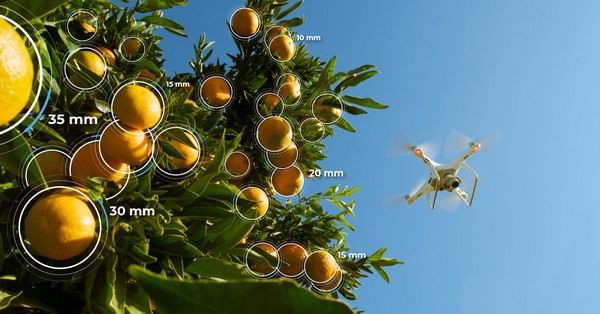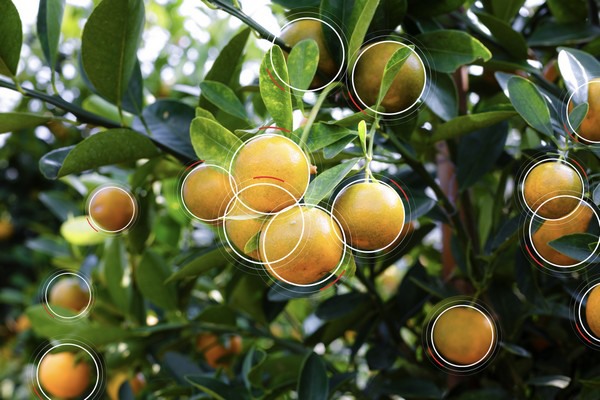Selecting the citrus fruits in the field at the time of harvesting in order to meet a specific demand is difficult to plan and very expensive when most of the farms are organized under a smallholder model, as is the case in Spain. The Spanish citrus sector is facing increasing competition from third countries, so cost efficiency is vital for the survival of a sector that has been hit hard in recent years, and digitization of the field may be key.
In August of this year, San Antonio Fruits, a company specialized in the production and sale of citrus fruits based in Alicante, Spain, announced an agreement with the company Aerobotics, a technology company devoted to data analysis and aerial images, which focuses on offering agricultural producers a service that gives them valuable and accurate information through the use of drones.

“Through state-of-the-art machine learning algorithms enabled by visual and multispectral drone imaging, we are able to obtain harvest estimation metrics. In this way, we can know what the fruit sizes are and learn about the distribution of the color in real time and, of course, better understand and plan the marketing strategies,” says José Castelló, director of San Antonio Fruits. “We are the only distributors of this technology in Spain. Our exclusive agreement covers its distribution, administration, implementation and any improvements across the Spanish territory. We make sure that the software's development is adapted to the characteristics of Spanish agriculture."
The benefits of this technology are revolutionary for the citrus sector, since it allows the producer to know how sizes are distributed and what the fruit's color is in real time, what the expected distribution of the harvest is, and to get estimates of tons per hectare (BETA phase). “Since we are able to discern what the fruit's size is after they are 24 mm thick, we can know what the size distribution will be in advance. For example, at this time, we are already flying over the Verna lemons that we'll harvest in April,” says José Castelló.
“Our goal is to save on operating costs and make plans based on the needs of our customers. This means that, if this week we need to pack caliber 3, the software will let us know which farm I have to go to. If we pick the fruit from the wrong farm, we will end up having extra harvesting costs and handling and storage expenses to keep the product we didn't need in a chamber; or even worse, underselling the fruit that we did not want. The software allows us to plan in a way that just didn't exist before. Now we can make decisions with greater reliability and better serve our end customers," he says.
“We believe that one of the biggest problems in Valencian agriculture is the smallholding. To tackle this, the sector needs some professionalization. With our drones, the agronomist of a cooperative with thousands of members can control the 20,000 plots from the comfort of their own office. In this way, you can plan your work and visit only those plots that require attention, without having to speak individually with each of the owners. It's also possible to find out if the production of certain plots does not meet the necessary quality requirements. We know first-hand that it's hard to compete with the production of other countries when this is not carried out on equal terms. The production and handling costs in our country are not comparable with those of Egypt or South Africa. Our technology allows us to reduce these expenses and improve the sector's effectiveness,” says José Castelló.
“Also, we offer solutions to other common problems, such as poor agricultural coverage and low precision, manual record keeping, the sector's lack of digitization and the digital divide in the rural world, which makes the sector less attractive to the new generations,” he says.

This technology is also a useful tool in pest monitoring, something that increasingly generates more costs for citrus growers, especially in the Region of Valencia. “We are able to evaluate the health of each tree, detecting problems in the early stages. The software detects trouble spots and sorts them into scan paths for further investigation. The explorers then use the phone app to direct them to these locations. The explorer completes a specific crop report and can add photos. The farm manager can then analyze reports, photos and areas of interest to assess the status of the crop directly from their computer. The analysis makes it easier to learn about infestation levels, trends, action thresholds and even decide on more localized treatment applications,” says José Castelló.
For San Antonio Fruits, investing in the improvement of production processes is very important. “We have to adapt the technology to Spain and invest heavily in marketing and distribution. The cost of this technology is low for the producers and does not require an initial investment. For example, in the case of lemons, our objective is for it to represent less than 0.005 Euro per kilo. Our prices are estimated per hectare, so our clients can try it in a small area and eventually extend it or stop using it when they consider it appropriate. However, once they try it and they see the advantages it brings, we doubt they'll want to do without the service.”
“We started implementing this technology in August and we are not yet covering all the hectares that we'd like. Instead of focusing on our own production, we have decided to make it available to other producers, in such a way that we treat our customers as our own partners. We are profiting and learning together from the technology, which we believe will revolutionize the future of citrus cultivation in Spain," says José Castelló.
For more information:
José Castelló
San Antonio Fruits
info@sanantoniofruits.com
www.sanantoniofruits.com
